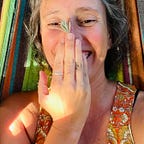The “landscape face”
In Portuguese, we have a familiar expression, “being with a landscape face.” This relatively common expression is used when you feel someone is extremely thoughtful, looking lost, and abstracted in some “unconstructive” or unhelpful concern or thought. It can also mean to pretend that nothing happened, to pretend that it’s not up to us, that we didn’t participate or do anything. Having a landscape face relates to not knowing or not wanting to be involved in what is happening, as if one is lost in the story, not engaging in the relationship or intimacy with what is happening. It is an expression that reveals a shield of separation between us and the context.
In fact, it reveals much more than that, as it expresses the deep (cultural) disconnect with our places and landscapes.
Two tragic assumptions are part of this seemingly innocent expression:
- That a landscape is something you can’t read, it is abstract, separate, and “out there.”
- That by adopting a “landscape face,” we get inert and mysterious scenery.
This cultural idea that a landscape is inert and unreadable is anthropocentric and extremely limited to human beings’ real and ancestral intimate relationship with their places.
For populations who bound and belong to the places they inhabit, a landscape is never abstract. What is more real and concrete than a complex living system that sustains and nourishes us each day, every day?
A landscape is a living symbiosis in deep reciprocity between countless open systems, giving us water to drink, air to breathe, food, medicine, myths, memories, and wisdom (just to name a few, for it entangles with all aspects and dimensions of life). In this rich ancestral legacy, every landscape is alive and full of immanent meanings. The dangerous myth of the separation between humans (mental) and nature is unreal and impossible. The body always inhabits the landscape and vice versa, in a living complexity that allows life itself in all its spectrum. But the exile of modern culture induces us to think otherwise.
The expression “landscape face” is very violent because it speaks of our orphanhood as a culture, of having been expelled from paradise and now living with crumbs of distant and abstract meanings, when the abundance is already here: in the topography, in the rocks, in the weather patterns, in the plants that grow around us and the animals that live here.
The expression “landscape face” is a direct product of the impoverishment and limitation of our capacity to relate to non-human “others”, a symptom of the catastrophic withering away of our multiple sensory wisdom and intelligence, and an indication of the profound cultural neglect to participate regeneratively in the dialogue of the web of life.
If you like the article, please clap. Remember that you can clap up to 50 times if you like it a lot!
[Disclaimer: all these words and weaved concepts are birthed through my lived, biased, and always limited perception, not supposing to bring any absolute truth.]
By Sofia Batalha
Mammal, author, woman-mother, question weaver and dismantling global-colonial-technological-capitalism one day at a time. Awkward prose-poet with no grammatical knowledge. Pilgrim through inner and outer landscapes, remembering ancient earth practices, in radical presence, active listening, ecopsychology, art, ecstasy, and writing. Author of seven books, editor of the free online magazine, Wind and Water, Re-member the Bones Podcast, and Beyond the Sea Conversations — all in Portuguese.
More information: sofiabatalha.com
